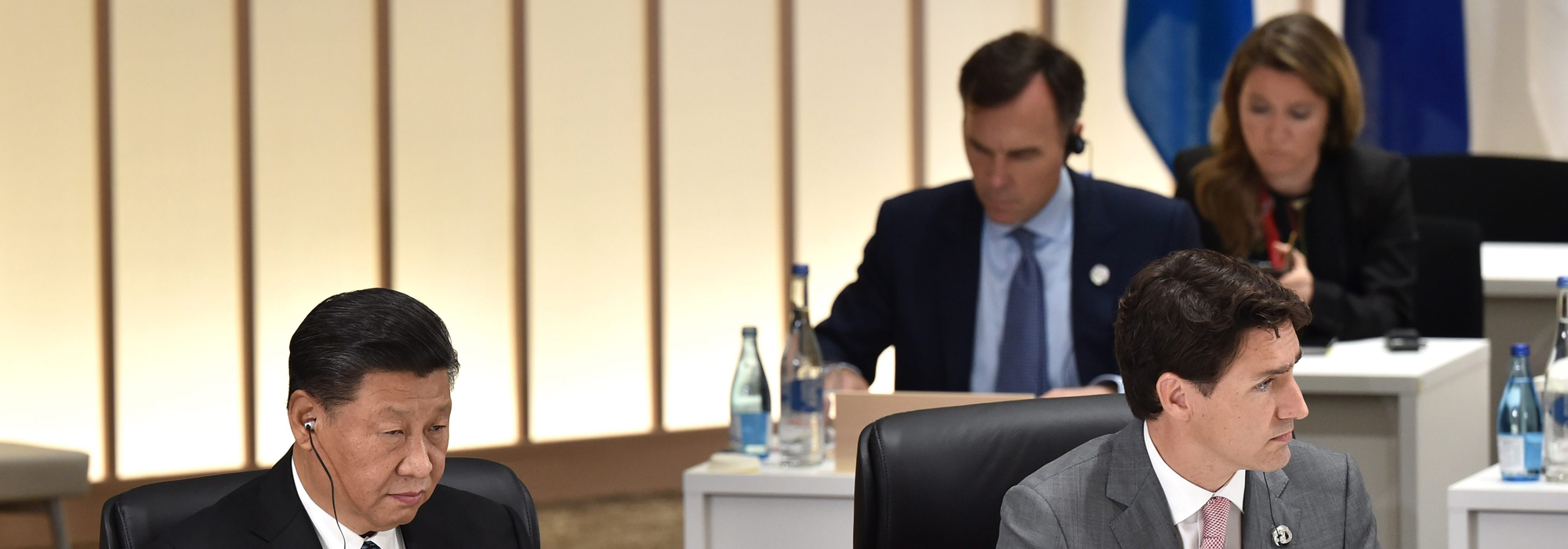
(This article has been translated from French.)
Amidst the diplomatic crisis affecting Canada-China relations that has followed the arrests of Huawei chief financial officer Meng Wanzhou and the two Canadians Michael Kovrig and Michael Spavor in December 2018, media commentary on China has been overwhelmingly negative. Developments in Xinjiang and Hong Kong plus increased attention to Chinese influence and interference activities in Canada and elsewhere have reinforced this negativity and led to calls for a more adversarial approach to China parallel to Washington’s strategic competition with Beijing.
What has been the effect of this tumult on Canadian public attitudes? The results of a third national survey, designed and administered between September 26 and October 3, 2019 – just before the election – by a team at the University of British Columbia in collaboration with a researcher from the University of Ottawa provide indications. The survey used a battery of questions similar to ones used in October 2017 and February 2019.
Favourable opinions about China are at 29 percent, lower than the 36 percent in October 2017 but up from a low of 23 percent in February 2019, a few weeks after the arrest of the two Canadians. The decrease in favourability towards China did not translate into an increase in unfavourable opinions, but rather in an increase in the level of undecided respondents. In the same period, the percentage of respondents who had a favourable opinion of the United States went from 52 percent in 2017 to 36 percent in February 2019 and to 51 percent in the fall of 2019.
Young Canadians have a more favourable opinion of China than older respondents. Among 19 to 33 year olds, 33 percent have favourable views of China compared with 48 percent of unfavourable views, whereas only 25 percent of respondents over 64 years old have a favourable view of China compared to 68 percent of unfavourable views.
There is also a divergence of opinion between anglophone and francophone respondents. Among francophone respondents (95 percent of whom live in Quebec), 34 percent have a favourable opinion of China compared with 29 percent of anglophone respondents. Fifty percent of francophone respondents hold an unfavourable opinion of China compared with 60 percent of anglophone respondents. At the same time, francophone respondents are less confident that China’s President, Xi Jinping, is doing the right thing in world affairs (80 percent have not too much or no confidence at all), compared with anglophone respondents (71 percent have not too much or no confidence at all).
To obtain a more nuanced picture of the situation, we asked several questions focused on political and socioeconomic aspects of Chinese and American global presence (Figure 1).
Overall, China is ahead of the United States in one dimension of global leadership out of eight (compared with four dimensions two years ago): economic power. In 2017, a larger number of Canadians thoughts China would surpass the United States as largest economic power, in doing more for the environment, in being a more stable and predictable power, and in doing more to maintain peace. Even on economic power, confidence in China is dropping: 64 percent of respondents thought China would become the largest economic power in the next decade in 2017, whereas only 47 percent think so in the fall of 2019. Media coverage of the U.S.-China trade war as well as of China’s slowing economic growth may have had an impact on perceptions by Canadians.
Again, we observe differences between the two linguistic groups: 26 percent of francophones and only 20 percent of anglophones think China will be a more responsible leader than the United States. Thirty percent of francophones think China will do more to maintain peace in the world compared with 21 percent of anglophones. When it comes to doing more for the environment, 26 percent of francophones and 21 percent of anglophones think China will do more than our neighbour to the south.
Wariness towards China does not translate into increased trust of the United States. As Figure 2 illustrates, 61 percent of respondents think Canada cannot now trust the United States. Seventy-eight percent of Canadians are wary of Donald Trump, higher than the number for Xi Jinping (72 percent). Francophones are even more wary of the American President: 85 percent do not trust him compared with 76 percent of anglophones.
Despite a decrease in trust of great powers on both sides of the Pacific, Canadians retain a balanced vision of our trilateral relations with the United States and China. A majority of respondents (68 percent) think Canada can maintain good relations with both China and the United States. For 63 percent of respondents, the United States remain a friend of Canada compared with 43 percent, who think China is a friend of Canada, a comparatively modest difference given the much closer nature of our relationship with the United States historically. Only 26 percent think we should support American policies even if it means worsening our relationship with China.
When we ask Canadians to identify the top priority for the government in dealing with China (Figure 3), promoting trade and investment is ranked first, building cooperation on global issues (climate change, peacekeeping, epidemics, counter-terrorism) second, and protecting Canadian values and institutions at home from growing Chinese influence is third. Advancing human rights and democratic reforms in China is fourth. The desire to see a deepening of economic exchanges with China is also apparent in the response to the question on the negotiation of a free trade agreement with China: 62 percent of respondents support the Canadian government entering into such an agreement. Francophone and anglophone responses are almost identical in this regard.</p>
In responding to a more detailed question about how could Canada best promote human rights in China, 26 percent of respondents would prefer that the Canadian government help “strengthen the rule of law in China through provisions and practices built into trade agreements”; 22 percent wish that the government would strengthen “human rights and democratic reforms here at home”; 20 percent think the government should raise “concerns privately in discussion between officials and leaders”; 15 percent judge that the government should increase bilateral flows of people-to-people exchanges; and only 9 percent are in favour of “public statements and pressure by the Canadian government.”
On the immediate policy choices facing Ottawa, Canadians have mixed views. While a high proportion are undecided (varying between 30 percent and 33 percent depending on the question) a plurality (39 percent) thinks that Canada made a mistake in arresting Meng Wanzhou and that the government should release her before judicial proceedings conclude (35 percent). At the same time 59 percent think “Ottawa has been right in treating this as an issue of rule of law rather than politics.” A strong majority, 74 percent, think the country “is caught in the middle of a conflict between the United States and China.” When it comes to opinions on Huawei, half of respondents think it would be “a mistake to allow Huawei or other Chinese companies to be a major provider to Canada’s 5G system.” But 43 percent think Huawei investments in research and development in Canada should be encouraged. Taken together, these responses indicate that the Canadian public has a nuanced opinion of China and that there could be potential support for distinct policies across different issues (5G infrastructure, investment, data protection, etc.).
Despite increasing wariness of China, the results suggest a significant foundation of public support for living and cooperating with China rather than any kind of decoupling or strategic confrontation. As trust in both China and the US decline, and even amidst strong anxieties about aspects of China’s international behaviour and its rising presence in Canada, Ottawa still has room to manoeuvre should it wish to pursue a balanced, independent and nuanced approach to China.
This Qualtrics panel survey of 1,503 Canadian adults was conducted in English and French, between September 26 to October 3, 2019 and has a margin of error of +/–3 percent. The full results are available here.
Photo: China’s President Xi Jinping (left) and Prime Minister Justin Trudeau (right) attend the G20 summit in Osaka, Japan, in June 2019. The summit gathers leaders from 19 countries and the European Union to discuss topics such as global economy, trade and investment, innovation and employment. EPA/KAZUHIRO NOGI / POOL
Do you have something to say about the article you just read? Be part of the Policy Options discussion, and send in your own submission. Here is a link on how to do it. | Souhaitez-vous réagir à cet article ? Joignez-vous aux débats d’Options politiques et soumettez-nous votre texte en suivant ces directives.













